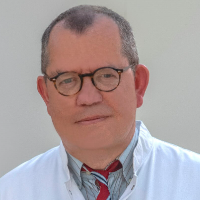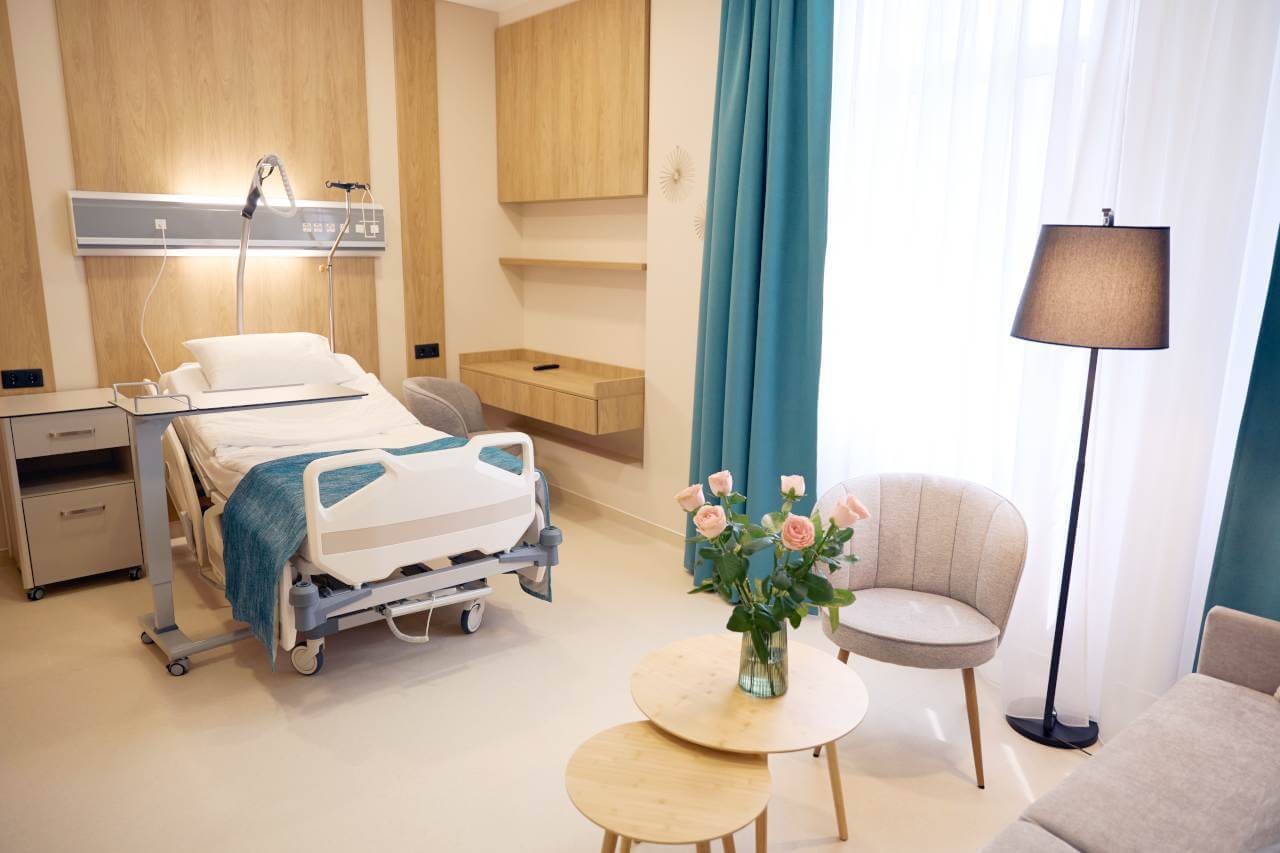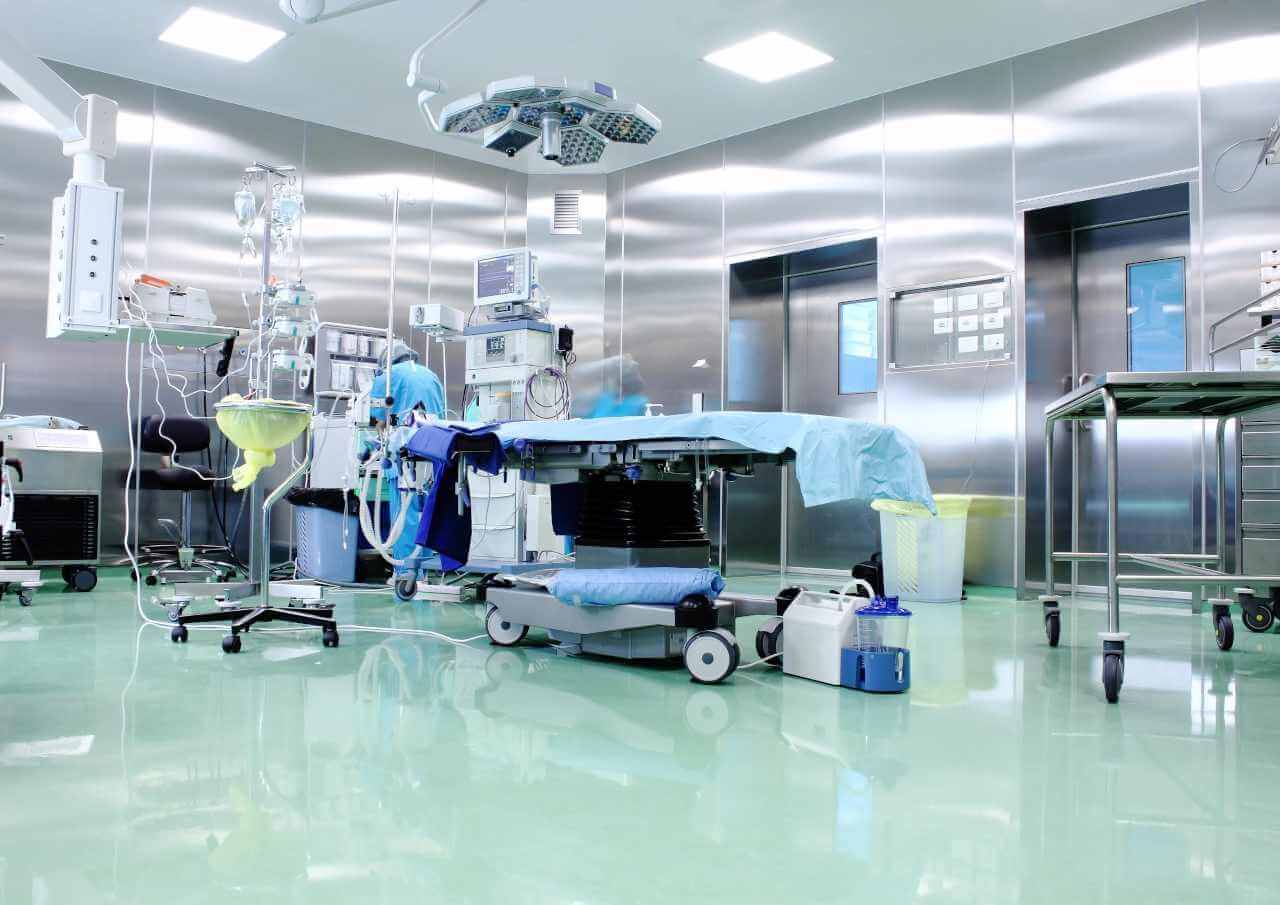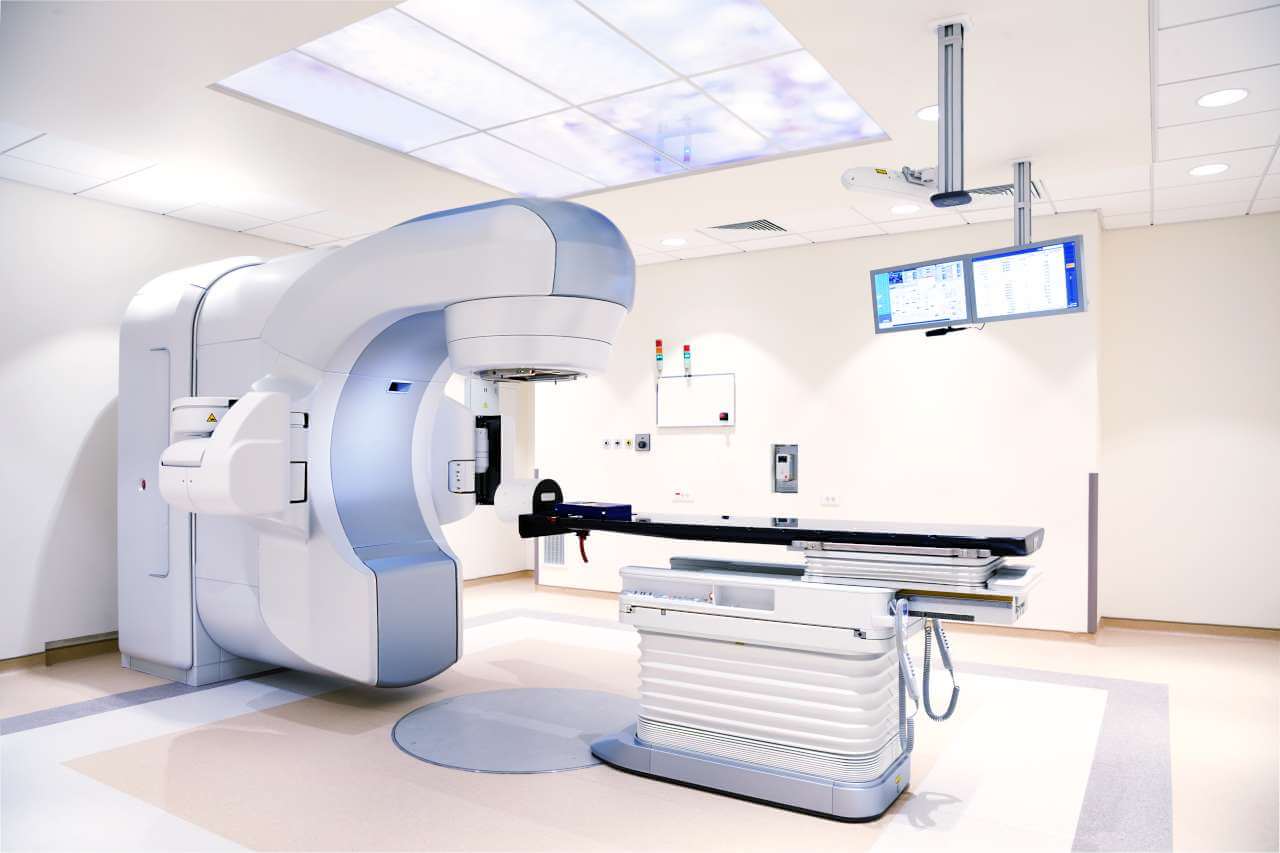
The program includes:
- Initial presentation in the clinic
- clinical history taking
- review of medical records
- physical examination
- laboratory tests:
- complete blood count
- biochemical analysis of blood
- inflammation indicators (CRP, ESR)
- indicators blood coagulation
- TSH-basal
- blood gas analysis
- chest x-ray examination
- measurement of arterial blood pressure
- electrocardiogram (ECG)
- echocardiography (ECHO)
- high-resolution computed tomography (HR-CT)
- ultrasound examination of the chest
- preoperative care
- treatment of the diaphragm ruptur with plastic operation
- symptomatic treatment
- control examinations
- the cost of essential medicines and materials
- nursing services
- full hospital accommodation
- explanation of future recommendations
Required documents
- Medical records
- Chest X-ray/CT scan (if available)
Service
You may also book:
 BookingHealth Price from:
BookingHealth Price from:
About the department
The Department of General and Abdominal Surgery, Hepatopancreatobiliary Surgery, Colorectal Surgery, Thoracic Surgery, Endocrine Surgery and Bariatric Surgery at the Hospital Frankfurt (Oder) specializes in performing a wide range of surgical interventions in the fields of its competence. The department operates on patients with diseases of the stomach, bowel, pancreas, biliary tract, liver, rectum, thyroid gland, parathyroid glands, and adrenal glands, with special attention being paid to cancer treatment. The primary focus of the department's clinical practice is the surgical treatment of diseases of the chest organs, excluding the heart. The team of thoracic surgeons successfully performs surgical interventions for lung cancer and lung metastases, mediastinal tumors, pneumothorax, pleurisy, and chest malformations. Another area of competence for the department's surgeons is bariatric surgery. Patients with morbid obesity are offered procedures such as intragastric balloon placement, gastric bypass surgery, and gastric banding. Many operations are performed using minimally invasive techniques, which ensures quick recovery in the postoperative period, low risks of complications, and excellent aesthetic results (barely noticeable scars remain). Thanks to their rich clinical experience and advanced technical base, surgeons successfully perform operations of any complexity. The department is headed by PD Dr. med. Michael Knoop.
Of particular interest for the department's team of general and abdominal surgeons is colon cancer treatment. This type of cancer is the second most common oncologic disease worldwide. In addition, colon cancer is among the most aggressive types of oncology. Patients with colon cancer receive medical care at a specialized center. Its work is certified by DIN EN ISO 9001:2015 and LGA InterCert GmbH standards. The Colon Cancer Center has a competent interdisciplinary team of physicians consisting of abdominal surgeons, oncologists, gastroenterologists, radiologists, and radiation therapists. The coordinated work of specialized doctors makes it possible to take into account the slightest peculiarities of the patient's clinical case and choose the optimal complex of therapeutic procedures for the patient. Before starting the treatment course, the patient undergoes comprehensive diagnostics, including laboratory tests, imaging tests (ultrasound, CT, and MRI), endoscopic examinations (colonoscopy and irrigoscopy), and a biopsy with a histological examination. As for the treatment, the best results provide a surgical resection of the malignant tumor (advanced stages require major resection with the removal of part of the organ). The advisability of the operation depends on the tumor location and the stage of the oncological process. In the advanced stages of cancer, curative surgery is not always possible, so palliative care comes to the fore in such cases. The treatment regimen also includes chemotherapy, radiation therapy, targeted therapy, and/or immunotherapy.
An integral part of the department's clinical practice is colorectal surgery. The specialists in this area operate on patients with hemorrhoids, rectal prolapse, rectal cancer, and anal cancer. The department also successfully performs anal sphincter reconstructive plastic surgery and anal sphincter electrostimulation procedures for the treatment of fecal incontinence. Patients with hemorrhoids often seek medical help from the department's colorectal surgeons. This disease is characterized by the pathological dilation of rectal blood vessels and the formation of hemorrhoidal nodes. Hemorrhoids are accompanied by unpleasant symptoms, such as a feeling of heaviness and burning in the anus, blood discharge after defecation, and pain during defecation. The early stages of the disease can be treated with conservative methods, so the specialists can prescribe patients rectal suppositories, antispasmodics, and anti-inflammatory drugs. In the advanced stages, the department's colorectal surgeons resort to minimally traumatic surgical interventions, including sclerotherapy, rubber band ligation, and infrared photocoagulation. The last-line treatment, which may be used in the most complex clinical cases, is a hemorrhoidectomy. This surgical procedure involves the excision of the hemorrhoidal nodes using a laser or a scalpel.
The team of thoracic surgeons performs surgical treatment for benign and malignant respiratory diseases. The focus of the specialists is on patients with lung cancer and lung metastases. Along with colon cancer, lung cancer is among the most common and life-threatening types of oncology. The success of lung cancer treatment largely depends on a high-quality diagnosis, because the specialists determine the stage of the oncological process and the grade of the tumor during the examination. A diagnostic protocol for suspected lung cancer includes CT and/or MRI scans of the chest organs, bronchoscopy, mediastinoscopy, biochemical blood tests, tumor marker tests, and a histological examination of the material obtained during a biopsy. The treatment regimen for lung cancer is developed during multidisciplinary tumor boards with the participation of thoracic surgeons, oncologists, and radiation therapists. Thoracic surgeons are responsible for performing surgical resection of the malignant tumor or part of the affected lung. The optimal type of surgical intervention depends on the stage of the oncologic disease. In cases of localized cancer, doctors perform a marginal resection, which involves removing the tumor and adjacent areas of healthy lung tissue. The surgical treatment for advanced stages includes a segmentectomy, during which surgeons excise the tumor with part of the lung, or a lobectomy involving the surgical removal of a lung lobe. If extensive spread of the malignant process is detected, a pneumonectomy (surgery to remove the lung) is performed. Whenever possible, the department's thoracic surgeons perform lung cancer surgery using video-assisted thoracoscopic surgical techniques (minimally traumatic techniques). The surgical treatment is often combined with conservative therapy, such as chemotherapy, radiation therapy, targeted therapy, and immunotherapy.
The department also has particular competence in bariatric surgery. Surgical interventions of this spectrum are indicated for patients with morbid obesity, which is diagnosed when the body mass index is 40 kg/m2 or higher and the patient cannot normalize it through diet, exercises, and drugs. The department's surgeons skillfully perform intragastric balloon placement, gastric bypass, and gastric banding. The goal of each of these operations is to reduce the volume of the stomach by placing an intragastric balloon, suturing the stomach and dividing it into small and large parts (gastric bypass), and applying a band to the upper part of the stomach (gastric banding). After bariatric surgery, the volume of the stomach is significantly reduced, resulting in a feeling of fullness faster and with less food consumed. Bariatric surgery is performed using minimally invasive techniques, so postoperative recovery occurs rapidly. Following the surgical intervention, nutritionists and trainers work with the patient. They individually develop a diet and select the optimal set of physical exercises.
The department's range of surgical services includes the following:
- General and abdominal surgery
- Surgery for malignant gastrointestinal diseases
- Surgery for colon cancer
- Surgery for stomach cancer
- Surgery for esophageal cancer
- Surgery for benign gastrointestinal diseases
- Surgery for diverticular disease
- Surgery for stomach adenomas
- Surgery for Crohn's disease and ulcerative colitis
- Surgery for gastroesophageal reflux disease
- Surgery for hernia repair: inguinal, umbilical, and incisional hernias
- Appendectomy (appendix removal surgery)
- Surgery for malignant gastrointestinal diseases
- Hepatopancreatobiliary surgery
- Surgery for malignant liver, gallbladder, bile duct, and pancreatic diseases
- Surgery for liver cancer
- Surgery for gallbladder cancer
- Surgery for bile duct cancer
- Surgery for pancreatic cancer
- Surgery for benign liver, gallbladder, bile duct, and pancreatic diseases
- Surgery for cirrhosis
- Surgery for liver cysts
- Surgery for gallstone disease
- Surgery for bile duct stenosis
- Surgery for pancreatitis
- Surgery for malignant liver, gallbladder, bile duct, and pancreatic diseases
- Thoracic surgery
- Surgery for malignant respiratory diseases
- Surgery for lung cancer and lung metastases
- Surgery for mediastinal malignancies
- Surgery for benign respiratory diseases
- Surgery for pneumothorax
- Surgery for pleurisy
- Surgery for chest malformations
- Surgery for malignant respiratory diseases
- Colorectal surgery
- Surgery for malignant rectal and anal diseases
- Surgery for rectal cancer
- Surgery for anal cancer
- Surgery for benign rectal and anal diseases
- Surgery for hemorrhoids
- Surgery for rectal prolapse
- Surgery for fecal incontinence
- Surgery for malignant rectal and anal diseases
- Endocrine surgery
- Surgery for malignant thyroid, parathyroid, and adrenal diseases
- Surgery for thyroid cancer
- Surgery for parathyroid cancer
- Surgery for adrenal cancer
- Surgery for benign thyroid, parathyroid, and adrenal diseases
- Surgery for nodular goiter
- Surgery for thyroid adenomas
- Surgery for Graves' disease
- Surgery for primary hyperparathyroidism
- Surgery for benign adrenal tumors
- Surgery for Cushing's syndrome
- Surgery for malignant thyroid, parathyroid, and adrenal diseases
- Bariatric surgery
- Intragastric balloon placement
- Gastric bypass
- Gastric banding
- Other surgical services
Curriculum vitae
PD Dr. med. Michael Knoop graduated from the Christian Albrecht University of Kiel, where he passed his state medical examination and defended his thesis in 1987.
From 1987 to 1990, the doctor trained abroad at the Cedars-Sinai Medical Center of the University of California in Los Angeles and at the University of Manchester in the United Kingdom.
In 1995, he was board certified in surgery. In the same year, Michael Knoop held the position of Senior Physician in the Department of Surgery at the Charite University Hospital Berlin. In 1997, he completed his board certification in abdominal surgery and his habilitation at the Humboldt University of Berlin with Venia Legendi.
In 1998, Dr. med. Michael Knoop held the position of Head Physician in the Department of General and Abdominal Surgery at the Johanniter Hospital, where he worked until 2001. The specialist then held the position of Head of the Department of General and Abdominal Surgery at the hospital in Stralsund. From 2004 to 2016, he worked as the Head of the Department of General and Abdominal Surgery, Hepatopancreatobiliary Surgery, Colorectal Surgery, Thoracic Surgery, Endocrine Surgery and Bariatric Surgery at the Hospital Frankfurt (Oder). He then worked for some time at the Picasso Clinic in Palma de Mallorca. In 2019, Dr. med. Michael Knoop returned to Germany, where he worked as the Deputy Head Physician of the Department of Surgery at the Charite University Hospital Berlin (the doctor’s key area of specialization at that time was pancreatic and colon surgery). In March 2022, he held the position of Head Physician of the Department of General and Abdominal Surgery, Hepatopancreatobiliary Surgery, Colorectal Surgery, Thoracic Surgery, Endocrine Surgery and Bariatric Surgery at the Hospital Frankfurt (Oder).
Of particular interest to the specialist is colorectal surgery, operations for diseases of the pancreas, liver, stomach, and esophagus, as well as surgical treatment of gastrointestinal cancers. The surgeon has a perfect command of minimally invasive techniques.
Photo of the doctor: (c) Klinikum Frankfurt (Oder)
About hospital
The Hospital Frankfurt (Oder) has an excellent reputation in the national and international medical arena, providing patients with high-quality medical services in accordance with the standards of modern medicine. The healthcare facility is an academic hospital of the Charite University Hospital Berlin and is also part of the Rhön-Klinikum AG medical concern. The health of patients is in the safe hands of a team of highly professional doctors and nursing staff, which, combined with advanced infrastructure and technical equipment, allows doctors to work wonders, curing patients from the most severe diseases.
The hospital has 25 specialized departments as well as highly specialized centers and institutes. Thus, almost all areas of medicine are represented here, including general, abdominal and thoracic surgery, neurosurgery, vascular surgery, orthopedics and traumatology, ophthalmology, dermatology, gastroenterology, nephrology, neurology, pediatric and adolescent medicine, radiation oncology, urology, etc. Special competence exists in the fields of gastroenterology, nephrology, infectology, rheumatology, and endocrinology. In addition, the hospital successfully carries out cell therapy and has been brilliantly performing autologous stem cell transplants on patients with hematological diseases and cancers for many years. The medical facility is the only one in the federal state of Brandenburg that performs allogeneic stem cell transplants from related donors.
All the hospital's doctors cooperate closely with each other, providing patients with comprehensive interdisciplinary treatment. An important component in the work of physicians is a humane attitude towards their patients and support for a patient on his way to recovery.
The medical center is certified in accordance with the DIN EN ISO 9001:2015 requirements and is awarded the IQM (Initiative Qualitätsmedizin) quality certificate, so patients can be sure that they will receive excellent medical service and successful treatment results.
Photo: (с) depositphotos
Accommodation in hospital
Patients rooms
The patients of the Hospital Frankfurt (Oder) live in comfortable single and double rooms with a modern design. The patient room furnishings include an automatically adjustable bed with an orthopedic mattress, a wardrobe, a desk, an armchair with a coffee table, a safe, a mini-fridge, a Full HD flat-screen TV, a telephone, and a radio. Each patient room has Wi-Fi access. The patient rooms are equipped with an ensuite bathroom with a shower and toilet, a heated towel rail, a hairdryer, a cosmetic mirror, a set of toiletries, a bathrobe, and bath towels.
Meals and Menus
The patients of the hospital are offered three tasty and healthy meals a day: breakfast, lunch, and dinner. If, for some reason, you do not eat all the foods, please inform the medical staff in advance, and you will be offered an individual menu.
The hospital also has a cozy cafe where one can taste a delicious meal, a cup of coffee, or tea with dessert. In the warm season, an open terrace is also available here.
Further details
Standard rooms include:
![]() Shower
Shower
![]() Toilet
Toilet
![]() Wi-Fi
Wi-Fi
![]() TV
TV
Religion
The hospital has a prayer room open to patients and their relatives. One can stay alone for a prayer, and holy masses are regularly held here.
Accompanying person
Your accompanying person may stay with you in your patient room or at the hotel of your choice during the inpatient program.
Hotel
You may stay at the hotel of your choice during the outpatient program. Our managers will support you for selecting the best option.





